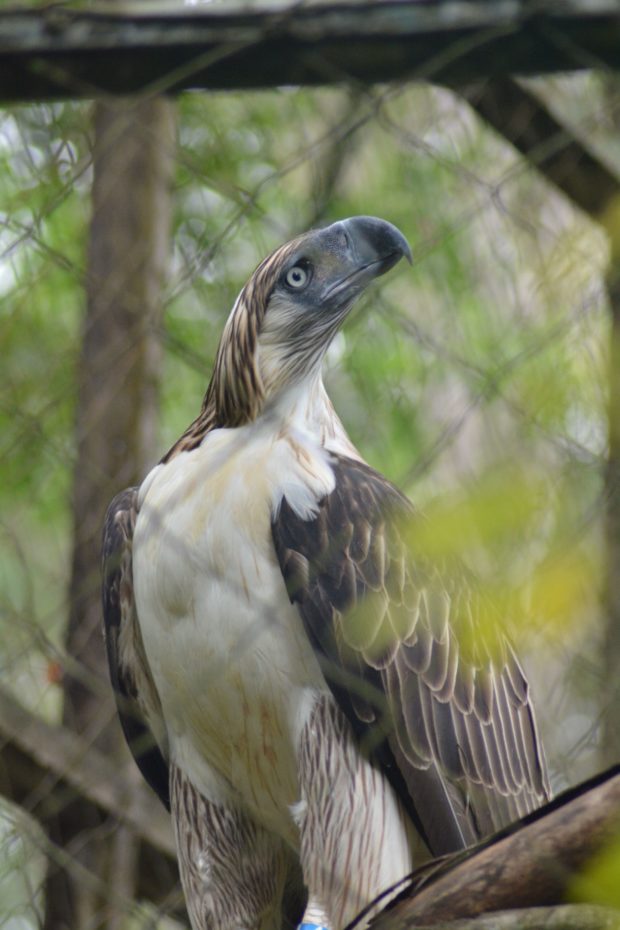Pandemic disrupts PH eagle protection

BIRD OF PREY Programs of Philippine Eagle Foundation and its Philippine Eagle Center in Davao City are aimed at preserving the population of the country’s national bird, one of the rarest and largest birds of prey in the world. —GERMELINA LACORTE
DAVAO CITY — Conservation efforts for the critically endangered Philippine eagle took a beating from the COVID-19 pandemic as the downtrend in tourism brought about by ensuing lockdowns deprived Philippine Eagle Center here of a huge chunk of its income.
This situation has prompted officials of Philippine Eagle Foundation (PEF) to appeal to the public for donations to continue their work to protect the giant raptors.
Dennis Joseph Salvador, PEF executive director, said the center’s main income stream almost ran dry as the pandemic forced it to close its gates to the public in March.
“We lost about a third of our revenue. A large chunk of conservation money came from the gates of the center,” Salvador told the Inquirer by phone on Monday. He was referring to PEF’s Philippine Eagle Center in the city’s Calinan District, where eagles are bred in captivity.
Tourists used to frequent the center, which is also home to other animals like monkeys, crocodiles, and other bird species, and currently houses 34 Philippine eagles either for breeding, education, or rehabilitation of those rescued from the wild.
Article continues after this advertisementAn estimated 400 pairs of Philippine eagles still remain in the wild.
Article continues after this advertisementMonthly losses
The International Union for Conservation of Nature has classified the Philippine eagle as critically endangered, which means that the species faces an extremely high risk of extinction in the wild due to human pressure, such as hunting and deforestation. Philippine eagles can live for at least 40 years in captivity but their life span is much shorter in the wild due to threats. A pair needs 4,000 to 11,000 hectares of forestland to thrive in the wild, depending on the number of prey items in the area. Dr. Jayson Ibañez, PEF director for research and conservation, told the Inquirer earlier that the center lost about P2 million monthly due to the COVID-19 lockdowns.
It reopened in October but operates at a limited capacity. It requires visitors to book at least 24 hours in advance and to wear face masks and shields, and observe physical distancing.
“We have been receiving very few visitors but in some days, there’s no one visiting at all,” Ibañez said.
The entrance fee has been packaged at P300 per person due to added activities, including the viewing of “Kalayaan”—a 10-minute film following a juvenile Philippine eagle’s journey in the wild.
Funding
Previously, the center charged P100 for children and P150 for adults. According to Ibañez, it received an average of 200,000 visitors annually, For the past 30 years, PEF has been getting major funding not from the government but from corporate and private contributors, Salvador said.
He said the pandemic posed a big challenge to the short-term conservation efforts for the national bird.
“We’re [financially] crippled due to lack of resources,” Salvador said. “Until this pandemic is effectively handled, the problem of lack of resources and policies associated in curtailing this pandemic will keep us grounded and unable to respond to the needs of the eagles in the wild.”
He assured the public that the foundation would try its best to respond to the needs of Philippine eagles, either in captivity or in the wild.
Salvador said the center managed to keep intact its almost 50 employees with the continuing support of corporate sponsors.
PEF also launched a crowdfunding campaign through social media. INQ
For more news about the novel coronavirus click here.
What you need to know about Coronavirus.
For more information on COVID-19, call the DOH Hotline: (02) 86517800 local 1149/1150.
The Inquirer Foundation supports our healthcare frontliners and is still accepting cash donations to be deposited at Banco de Oro (BDO) current account #007960018860 or donate through PayMaya using this link.